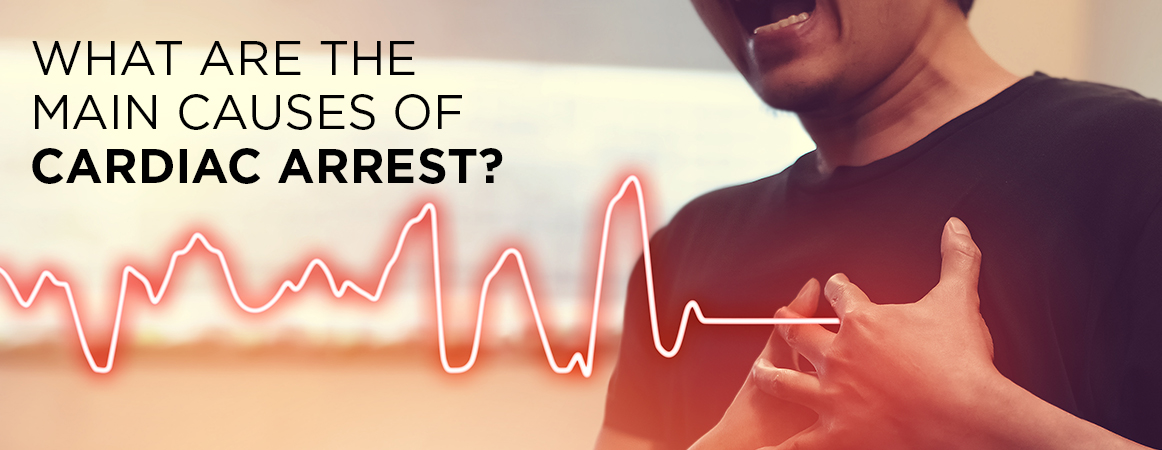What are the Main Causes of Cardiac Arrest
An abrupt loss of consciousness, breathing, and heart function is known as a sudden cardiac arrest. The condition is often brought on by a problem with your heart’s electrical system, which interferes with your heart’s ability to pump blood throughout your body.
If a sudden cardiac arrest is not treated promptly, it may cause death. With prompt, effective medical care, survival is possible. The likelihood of surviving until help arrives can be increased by performing cardiopulmonary resuscitation (CPR), utilizing a defibrillator, or even just applying chest compressions.
Why Do Cardiac Arrests Happen?
An abnormal heart rhythm (arrhythmia), which occurs when your heart’s electrical system isn’t functioning properly, is typically the cause of sudden cardiac arrest.
The rhythm and frequency of your heartbeat are controlled by the electrical system in your heart. Your heart may beat abnormally or too quickly if something is wrong (arrhythmia). These arrhythmias are frequently transient and harmless, but some can cause rapid cardiac arrest.
Arrhythmia in the lower chamber of your heart is the most frequent heart rhythm at the moment of cardiac arrest (ventricle). Instead of pumping blood, your ventricles quiver ineffectively due to irregular, rapid electrical impulses (ventricle fibrillation).
Cardiac Arrest Causes
Most sudden cardiac arrests are brought on by abnormal heart rhythms known as arrhythmias. Ventricular fibrillation, which can be fatal, is the most typical arrhythmia. This is when the ventricles of your heart are firing impulses in an unpredictable, chaotic manner (lower chambers). Your heart is then unable to pump blood. Without medical attention, you could pass away in a matter of minutes.
Sudden cardiac arrest causes include:
- Cardiovascular disease
- Congenital heart problems (since birth)
- Changes to the anatomy of your heart brought on by illness or infection
- Extreme physical exertion or bleeding
Other causes of cardiac arrest include:
Scarring of the heart tissue: A previous heart attack or another factor could be to blame. Ventricular arrhythmias, which can be fatal, are more likely to develop in a heart that has been damaged or enlarged due to any reason.
Thickened heart muscle (cardiomyopathy): High blood pressure, heart valve dysfunction, and other factors can lead to heart muscle damage. You may be more susceptible to sudden cardiac arrest if your heart muscle is ill.
Heart medications: Some heart drugs have the potential to create conditions for arrhythmias that result in sudden cardiac arrest. Significant variations in potassium and magnesium levels in the blood can result in cardiac arrest and other life-threatening arrhythmias.
Electrical abnormalities: Children and teenagers may experience sudden cardiac arrest due to these conditions, which include Wolff-Parkinson-White syndrome and Long QT syndrome.
Blood vessel abnormalities: These uncommon occurrences mostly affect the aorta and coronary arteries. When these problems exist, the adrenaline released during vigorous physical exertion can cause abrupt cardiac arrest.
Recreational drug use: Can using drugs cause cardiac arrest? Yes, this can happen to otherwise healthy individuals who use recreational drugs.
Consult a cardiologist in Karachi at Memon Medical Institute Hospital to get your heart health checked.
Risk Factors of a Cardiac Arrest
Because coronary artery disease and sudden cardiac arrest are so frequently related, the same factors that increase your risk for coronary artery disease also increase your chance of sudden cardiac arrest. These include:
- Family history of CAD
- Smoking
- Elevated blood pressure
- High cholesterol levels
- Obesity
- Diabetes
- Sedentary lifestyle
Your risk of sudden cardiac arrest may also be affected by the following factors:
- A previous heart attack
- When you become older, your risk of suffering a sudden cardiac arrest rises
- If you are a male
- Kidney disease
- Having low levels of magnesium or potassium
- Utilizing illicit substances, such as cocaine or amphetamines
- Sleep apnea
Cardiac Arrest Treatment
For the treatment and reversal of sudden cardiac arrest, immediate CPR is essential. However, immediate emergency action must be taken. If treatment is administered within the first few minutes following a sudden cardiac arrest, the chance of survival may reach 90%. Each minute that passes results in a 10% decrease in pace.
CPR can act as a lifeline until more advanced emergency care is available by ensuring that oxygen-rich blood is flowing to the body’s important organs.
By obtaining frequent checkups, getting checked for heart disease, and leading a heart-healthy lifestyle, you can lower your risk of sudden cardiac arrest.
Find the best cardiologist doctor in Karachi at MMI hospital. Cardiologists at MMI also instruct their patients on several methods of preventing heart disease and encourage them to adopt practices that can lower their risk.


